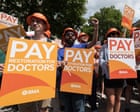
In a landscape where dedication and resilience have formed the backbone of healthcare response across the nation, the potential for further strikes among resident doctors in England highlights a significant intersection of profession, policy, and public service. As these doctors, formerly known as junior doctors, contemplate a 29% pay rise, healthcare leaders express a mix of understanding and caution regarding the possible impacts on clinical services. With the potential for hundreds of thousands of delayed procedures, there remains a palpable sense of anticipation regarding the outcome of the impending ballot.
Delving deeper into the context, it’s essential to recognize the role of many resident doctors who, driven by their professional commitment, continue to play a pivotal role in patient care across England. Their call for increased remuneration reflects broader discussions about professional valuation and the balance of work-life pressures, particularly pronounced in sectors deeply affected by global events and national policy shifts.
Resident doctors are integral to the National Health Service (NHS), providing care and treatment at various levels of hospital operations. Their roles are multifaceted, encompassing everything from routine check-ups and emergency care to participation in innovative research and medical teaching. The renewed industrial action highlights their ongoing concerns about workload pressures and the need for a fair compensation model that reflects the evolving demands and expectations placed upon them in contemporary healthcare.
The British Medical Association (BMA), representing the interests of resident doctors, has made clear the rationale for a 29% pay increase, emphasizing alignment with past inflationary trends and restoration of earnings following a decade of relative pay decline. The forthcoming ballot is crucial, potentially steering the course of negotiations and leading to a series of organized strikes designed to underscore the depth of feeling within the profession about the adequacy of remuneration.
Organizational preparedness within the NHS demonstrates a proactive approach to potential disruptions. Hospitals are attentively crafting contingency plans to mitigate impacts on patient care. This involves rescheduling non-urgent procedures, liaising closely with primary care providers, and deploying resources effectively to sustain essential services during periods of reduced staffing.
The potential for industrial action is not merely a reflection of financial grievances but represents a broader dialogue about the evolving landscape of healthcare service delivery in England. It touches upon themes of workforce sustainability, retention, and the moral imperative of ensuring that those who dedicate their lives to health and well-being are both valued and supported.
Dialogue remains open as NHS leaders and the BMA explore paths towards resolution. Key focus areas include structured negotiation processes and collaborative frameworks to address financial and operational challenges comprehensively. Previous discussions have highlighted the importance of understanding economic constraints while recognizing the critical contributions of healthcare professionals.
Public sentiment and stakeholder engagement are equally vital in shaping the path forward. Patients and the wider community, who recognize the crucial service provided by doctors, often find themselves in an empathetic stance, aware of the complexities inherent in healthcare negotiations and the journey to reach equitable agreements that benefit public health.
As the ballot’s closure approaches, it serves as a moment of reflection for the NHS and its many stakeholders. It highlights ongoing discussions around optimizing resource allocation, maintaining high standards of care, and nurturing an environment where medical professionals feel valued, supported, and motivated in their commitment to care.
This moment offers an opportunity to galvanize collective goodwill, encourage constructive dialogue, and focus on shared goals of patient-centered care, professional satisfaction, and organizational excellence. By acknowledging these dimensions, the NHS can navigate the current challenges with resilience and foresight, ensuring that it remains a model for compassionate and effective healthcare delivery.
Source: {link}
